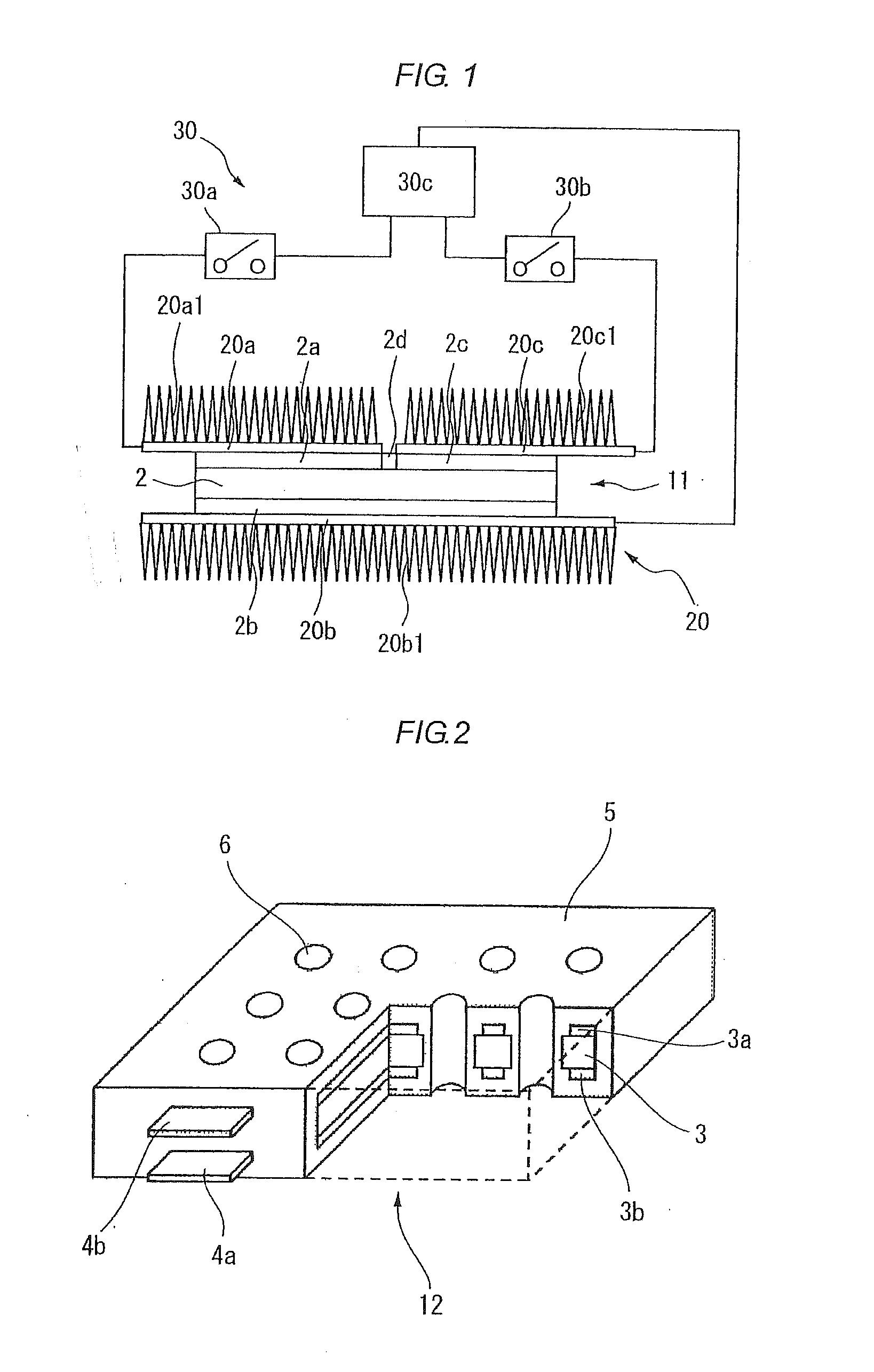Semiconductor ceramic composition, method for producing same, PTC element and heat generating module
a technology of semiconductor ceramics and heat generating modules, applied in the direction of bismuth compounds, inorganic chemistry, conductive materials, etc., can solve problems such as change, and achieve the effects of stable room temperature resistivity, small change with time, and excellent jump characteristics
- Summary
- Abstract
- Description
- Claims
- Application Information
AI Technical Summary
Benefits of technology
Problems solved by technology
Method used
Image
Examples
example 1
[0078]The following semiconductor ceramic composition was obtained using the remaining method. Raw material powders of BaCO3, TiO2 and La2O3 were prepared and then blended so as to be (Ba0.998La0.002)TiO3, followed by mixing in pure water. The resulting mixed raw material powder was calcined in the air at 900° C. for 4 hours to prepare a BT calcined powder.
[0079]Raw material powders of Na2CO3, Bi2O3 and TiO2 were prepared and then weighed and blended so as to be Bi0.57Na0.50TiO3 (molar ratio Bi / Na of Bi to Na was 1.14), followed by mixing in ethanol. The resulting mixed raw material powder was calcined in the air at 800° C. for 2 hours to prepare a BNT calcined powder.
[0080]The prepared BT calcined powder and BNT calcined powder were blended so that the molar ratio became 73 / 7. Mixing and pulverization were performed by a pot mil using pure water as a medium until the central particle diameter of the mixed calcined powder became 1.0 μm to 2.0 μm, followed by drying. PVA was added in...
example 2
[0091]Example 2 is an example where the amount of La substitution and the molar ratio Bi / Na of Bi to Na in Example 1 were changed. Similarly to Example 1, a semiconductor ceramic composition was obtained as follows using the first method of the invention in the process of the remaining method. Raw material powders of BaCO3, TiO2 and La2O3 were prepared and then blended so as to be (Ba0.004La0.006)TiO3, followed by mixing in pure water. The resulting mixed raw material powder was calcined in the air at 900° C. for 4 hours to prepare a BT calcined powder.
[0092]Raw material powders of Na2CO3, Bi2O3 and TiO2 were prepared and then blended so as to be Bi0.53Na0.50TiO3 (molar ratio Bi / Na of Bi to Na was 1.06), followed by mixing in ethanol. The resulting mixed raw material powder was calcined in the air at 800° C. for 2 hours to prepare a BNT calcined powder.
[0093]The prepared BT calcined powder and BNT calcined powder were blended so that the molar ratio became 73 / 7. Mixing and pulveriza...
examples 3 to 5
[0095]In Examples 3 to 5, each sintered body was obtained using the same composition and production method as in Example 2. However, they are examples where the molar ratio Bi / Na of Bi to Na was changed. The evaluation methods were also the same as in Example 1. The results obtained are shown in Table 1. The results of Examples 3 to 5 satisfied the target property values in all of the room temperature resistivity R25, the temperature coefficient of resistivity α and the change with time. Incidentally, it is revealed that there is a tendency that the temperature coefficient of resistivity α is increased but the change with time cannot be sufficiently decreased when the molar ratio Bi / Na of Bi to Na approaches 1.02 and there is another tendency that the change with time is decreased but the temperature coefficient of resistivity α cannot be sufficiently increased when the ratio approaches 1.20.
PUM
| Property | Measurement | Unit |
|---|---|---|
| molar ratio | aaaaa | aaaaa |
| molar ratio | aaaaa | aaaaa |
| molar ratio | aaaaa | aaaaa |
Abstract
Description
Claims
Application Information
 Login to View More
Login to View More - R&D
- Intellectual Property
- Life Sciences
- Materials
- Tech Scout
- Unparalleled Data Quality
- Higher Quality Content
- 60% Fewer Hallucinations
Browse by: Latest US Patents, China's latest patents, Technical Efficacy Thesaurus, Application Domain, Technology Topic, Popular Technical Reports.
© 2025 PatSnap. All rights reserved.Legal|Privacy policy|Modern Slavery Act Transparency Statement|Sitemap|About US| Contact US: help@patsnap.com

